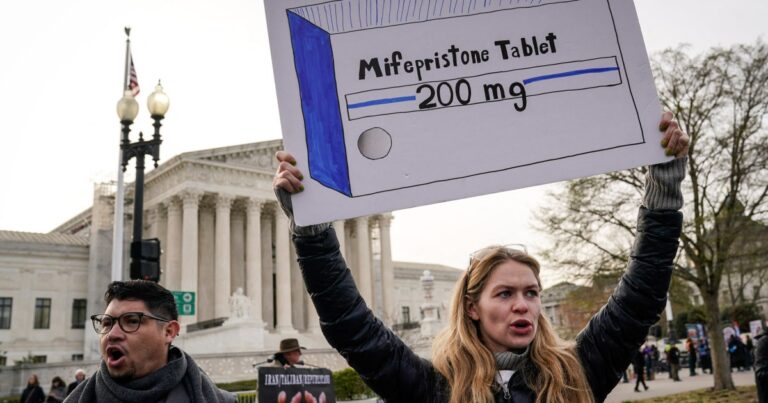WASHINGTON — The Supreme Court on Thursday rejected a challenge to the abortion drug mifepristone, meaning the commonly used drug will remain widely available.
The court unanimously ruled that anti-abortion doctors who questioned the Food and Drug Administration’s decision to make the pill more available had no legal basis to sue.
Writing for the court, Justice Brett Kavanaugh wrote that the plaintiffs “have bona fide legal, moral, philosophical, and policy objections to elective abortion and to the FDA’s deregulation of mifepristone,” but that this does not mean they have standing to bring a federal lawsuit.
Because the plaintiffs have failed to prove they suffered harm, “federal court is an inappropriate forum to address the plaintiffs’ concerns about FDA’s actions,” he added.
“Plaintiffs may raise concerns or challenges to the President and the FDA in the regulatory process, or to Congress and the President in the legislative process,” Kavanaugh wrote, “and may also express their views about abortion and mifepristone among fellow citizens, including in the political and electoral processes.”
By dismissing the case on these grounds, the court avoided deciding the legal merits of whether the FDA’s actions to lift various restrictions, including making drugs available by mail, were lawful — meaning the same issue could come before the court again in a different case.
Another regulatory decision means women can get the pill up to the 10th week of pregnancy instead of the seventh.
Similarly, the decision to allow health care providers other than physicians to prescribe the pill will remain in effect.
The decision came two years after the Supreme Court, with a 6-3 conservative majority, overturned Roe v. Wade, a landmark decision on abortion rights that led to a new wave of abortion restrictions in conservative states.
Although the Supreme Court has since signaled that it will step aside from the political debate over abortion, it continues to play a vital role as litigation over abortion rights continues to rage.
Abortion rights advocates welcomed the ruling, with Nancy Northup, executive director of the Center for Reproductive Rights, saying she was relieved by the ruling but frustrated that the case had been stuck in the courts for so long.
“Thankfully, the Supreme Court rejected this unjust attempt to restrict access to medication abortion, but the fact remains that this baseless lawsuit should never have gone this far,” she said in a statement.
The battle over mifepristone is not the only abortion case currently before the court: The case will also determine whether Idaho’s strict anti-abortion laws prevent emergency room doctors from performing abortions when pregnant women face dangerous complications.
Mifepristone is currently used as part of an FDA-approved two-drug combination, the most common method of abortion in the United States.
Abortion is effectively banned entirely in 14 states, according to the Guttmacher Institute, a research group that supports abortion rights.
The FDA is backed by the pharmaceutical industry, which has warned that allowing untrained federal judges to question the approval process could create confusion and stifle innovation.
The lawsuit was filed by doctors and other medical professionals represented by the conservative Christian legal group Alliance Defending Freedom.
Last year, U.S. District Judge Matthew Kacsmarik in Texas issued a sweeping ruling that completely invalidated the FDA’s approval of the pill, sparking panic among abortion rights activists that the pill would be banned nationwide.
The Supreme Court put the decision on hold in April last year, leaving the pill widely available while the litigation continued.
The New Orleans-based 5th U.S. Circuit Court of Appeals in August narrowed Kacsmarik’s ruling but upheld his conclusion that the FDA’s move to lift regulations from 2016 was unlawful.
Both sides appealed to the Supreme Court, which in December took up the Biden administration’s appeal defending the FDA’s subsequent decision, opting not to hear the challenge to mifepristone’s initial approval in 2000.
The Supreme Court focused solely on subsequent FDA actions, including its first decision in 2021 that made the drug available by mail, which was finalized last year.

